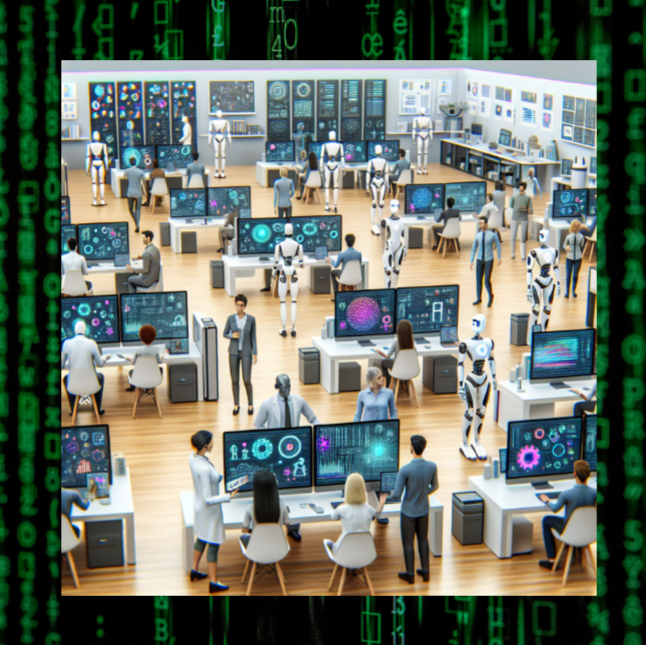In our rapidly evolving world, the integration of technology into education is more important than ever.🌍📖
One of the most exciting advancements in this field is the rise of Artificial Intelligence (AI) research assistants. These innovative tools are set to transform the landscape of expert-involved learning, making education more effective and engaging for everyone. 🌟
What Are AI Research Assistants? 🤖
AI research assistants are advanced digital tools designed to support both educators and learners. Utilizing sophisticated algorithms and machine learning, these assistants can process vast amounts of information, provide valuable insights, and create personalized learning experiences. This modern approach not only enhances the educational process but also allows experts to concentrate on their primary roles—teaching and mentoring. 📚
The Benefits of AI in Education🎓
AI research assistants bring a multitude of benefits to the educational landscape. Here are some of the key advantages:
- Personalized Learning Experiences: AI research assistants can customize educational content to fit the unique needs of each learner. By evaluating individual strengths and weaknesses, these tools can suggest resources and strategies that optimize learning outcomes. 🎯
- Enhanced Collaboration: With AI, experts can work together more effectively. The technology can streamline communication, manage schedules, and even assist in research, allowing educators to spend more time engaging with students. 🤝
- Data-Driven Insights: AI can analyze trends and patterns in student performance, providing educators with valuable insights that inform teaching strategies. This data-driven approach enables continuous improvement in educational practices. 📊
- Accessibility: AI research assistants can help bridge the gap for learners with diverse needs. By offering resources in various formats and languages, these tools ensure that education is accessible to everyone, regardless of their background or learning style. 🌍
How AI Research Assistants Enhance Personalized Learning🎓
One of the standout features of AI research assistants is their ability to create personalized learning experiences. Traditional education often follows a one-size-fits-all approach, which can leave some students behind. However, AI can analyze a learner’s progress and adapt the curriculum accordingly. Here’s how:
- Adaptive Learning Paths 🧭: AI can create customized learning paths based on a student’s performance, ensuring they receive the right level of challenge and support.
- Real-Time Feedback ⚡📝: With AI, students can receive immediate feedback on their work, allowing them to understand their mistakes and learn from them instantly.
- Resource Recommendations 📚🔍: AI can suggest additional resources, such as videos, articles, or exercises, tailored to a student’s specific needs and interests.
Fostering Collaboration Among Educators 👩🏫🤝👨🏫
Collaboration is key in education, and AI research assistants can significantly enhance this aspect. By automating administrative tasks, these tools allow educators to focus on what truly matters—interacting with students and sharing knowledge. Here’s how AI fosters collaboration:
- Streamlined Communication 📢💬: AI can facilitate communication between teachers, students, and parents, ensuring everyone is on the same page.
- Shared Resources 🗂️🤗: Educators can easily share teaching materials and strategies through AI platforms, promoting a collaborative environment.
- Research Assistance 🔬📈: AI can assist educators in conducting research, analyzing data, and staying updated on the latest educational trends.
Data-Driven Insights for Continuous Improvement 📊🧠
AI research assistants excel at providing data-driven insights that can help educators refine their teaching methods. By analyzing student performance data, AI can identify trends and suggest improvements. Here’s how:
- Performance Tracking 🧾📈: AI can track student progress over time, helping educators identify which teaching methods are most effective.
- Identifying Learning Gaps 🕳️📉: By analyzing data, AI can pinpoint areas where students struggle, allowing educators to address these gaps proactively.
- Informed Decision-Making 🎯📚: With access to comprehensive data, educators can make informed decisions about curriculum changes and teaching strategies.
Making Education Accessible for All 🌍📖
Accessibility is a critical issue in education, and AI research assistants can play a significant role in ensuring that learning is available to everyone. Here’s how:
- Diverse Formats 🎧🎥📘: AI can provide educational content in various formats, such as audio, video, and text, catering to different learning preferences.
- Language Support 🈶🌐: AI can translate resources into multiple languages, making education more inclusive for non-native speakers.
- Support for Diverse Needs ♿🧩: AI can adapt resources for students with disabilities, ensuring that everyone has the opportunity to learn effectively.
The Future of Expert-Involved Learning 🚀🔮
As we look ahead, the role of AI in education is set to expand even further. The potential for AI research assistants to revolutionize expert-involved learning is immense. By fostering collaboration, enhancing personalization, and providing data-driven insights, these tools are poised to redefine the educational landscape. 🌟📘
In conclusion, the integration of AI research assistants into expert-involved learning represents a significant leap forward in education. As technology continues to evolve, so too will the ways in which we teach and learn. Embracing these advancements will not only benefit educators and experts but also empower learners to reach their full potential. 🚀
Stay tuned for more updates on the intersection of technology and education, and how AI is shaping the future of learning!
For those interested in exploring automation and technology solutions, check out our sponsor: Make.com.
